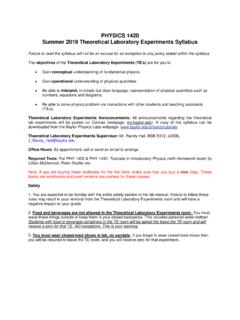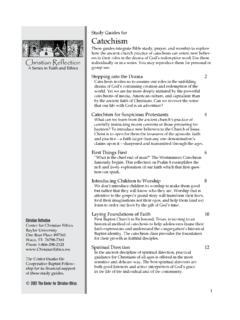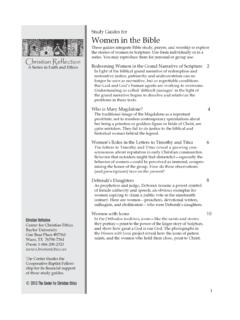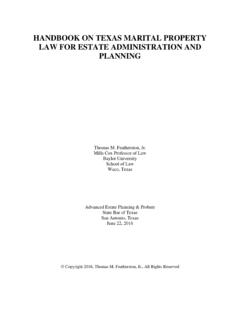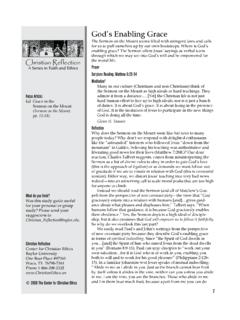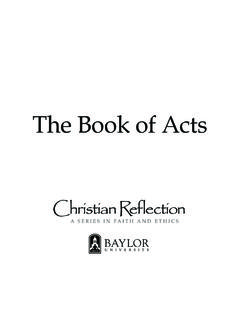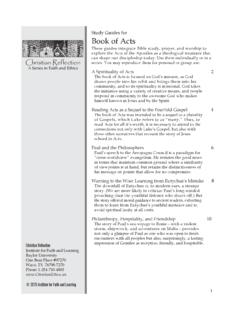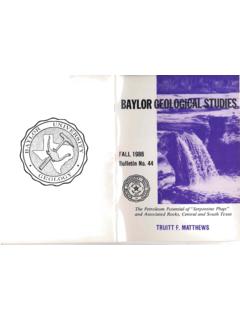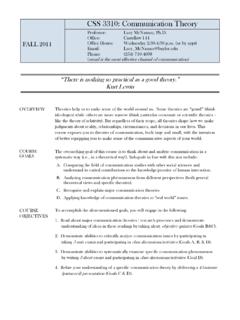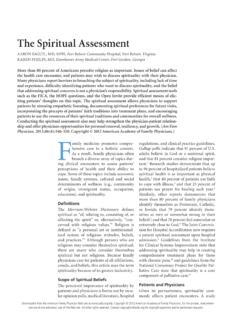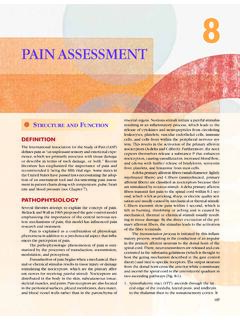Transcription of Paul’s Assessment of Christian Freedom - Baylor University
1 paul s Assessment of Christian FreedomIn an awkward but memorable phrase, the Apostle paul declares: It is for Freedom that Christ has set us free. The story of Jesus Christ, as it comes to life in his followers, is a story of Freedom , to be sure, but a Freedom constrained by the Cross and deeply at odds with individualistic notions of liberty. PrayerScripture Reading: Galatians 5:1, 13-15 ReflectionThough we immediately resonate with paul s reminder to the Galatian Christians that they were called to Freedom (5:13a), it is easy for us to misunderstand the Christian liberty that he commends to them.
2 Today many people often think of Freedom as the maximum ability to choose whatever life I want to live with a minimum of external attachments, Will Willimon observes. A person who is externally determined, who lacks Freedom of choice, who has succumbed to any limitations upon self-expression is hardly a person. But can this self-determining individualism be what the Apostle had in mind for the Galatians?Bruce Longenecker explores paul s gospel of Freedom , especially in his letters to Christians in Galatia, Rome, and Corinth.
3 Returning each time to Galatians 5:13, Longenecker uncovers three levels of meaning in the Apostle s teaching. 4 Freedom from moral libertinism. paul was urging the gentile Chris-tians in Galatia to resist enslavement to certain applications of the Torah like the rules for food or requirement of circumcision that had caused a rift in Antioch (Galatians 3). By their faithful obedience to Christ, they were already heirs of Abraham (3:15-18), like children of the free woman Sarah instead of the slave woman Hagar (4:21-31).
4 paul s teaching on Freedom was misinterpreted. Christians in Corinth concluded I have the right to do anything (1 Corinthians 6:12 and 10:23). Some believers in Rome slandered paul by claim-ing he taught Let us do evil that good may result (Romans 3:8; cf. 6:1, 15); these ethical libertines presumed on God s grace toward sinners We can do anything we want, because God will forgive us. paul says about people who misrepresent the gospel this way: Their condemnation is deserved! (Romans 3:8). Notice how paul includes his response in Galatians 5:13, where he warns do not use your Freedom as an opportunity for self-indulgence.
5 4 Freedom from self-interest. paul puts this condemnation of liberti-nism into cosmic context in Romans. Adam s act of sin opened the door for suprahuman powers of Sin (Romans 3:9) and Death (5:12-21) to wreak havoc in God s good creation. These powers hijacked the God-given law to serve their purposes (7:7-25; cf. 8:2). Though we were slaves of sin (6:20), through baptism we are freed from sin (6:7, 18, 20, 22). This does not mean we are free to commit sins; rather we are to be slaves of righteousness (6:18; cf.)
6 6:20, 22). Although Christians do not observe the law, 4 What do you think?Was this study guide useful for your personal or group study? Please send your suggestions to ReflectionCenter for Christian EthicsBaylor UniversityOne Bear Place #97361 Waco, TX 76798-7361 Phone 1-866-298-2325 2011 The Center for Christian EthicsChristian ReflectionA Series in Faith and EthicsFocus Article: paul s Assessment of Christian Freedom ( Freedom , pp. 19-27)Suggested Article: Freedom ( Freedom , pp.
7 74-77)5there is a sense in which the law itself is fulfilled in Christians through the Spirit, who brings alive loving patterns of life within Jesus followers, Longenecker writes. Sin can externalize and twist God s law into temptations to all kinds of covetousness (Romans 7:8), but the Spirit inspires patterns of love that (inad-vertently) fulfill the law. Notice how paul includes this idea in Galatians 5:13, saying through love become slaves to one anoth-er. In sinful coveting the Galatians might bite and devour one another (5:15); the gospel frees them for self-giving.
8 4 Enslavement to one another. paul s image of our becoming slaves is startling, but essential. It corrects the moral chaos that paul encountered in Corinth. Over and over, [the Corinthian Chris-tians] interpreted their Freedom in Christ along individualistic lines, without regard to the health of the Christian community, Longenecker notes. They employed spiritual gifts for personal advantage (1 Corinthians 13) and ate meat from pagan rituals without regard for how this practice influenced other believers (1 Corinthians 8:1-13).
9 Yet after the Corinthians allowed God to align their practices with the gospel, paul praises their transformation into self-sacri-ficing Christlikeness through the Spirit of Freedom (2 Corinthians 3:17-18). Likewise, he commends this renovation of the heart to the Galatians: I have been crucified with Christ and I no longer live, but Christ lives in me (2:20). As they are crucified with Christ, they become the means for the self-giving Christ to live through them, serving s strange claim that It is for Freedom that Christ has set us free is clarified by this relationship between salvation and ethics.
10 The phrase Christ has set us free pertains to the salvation of Jesus followers, while for Freedom pertains to the ethical lifestyle of Jesus followers, Longenecker concludes. Christians have been set free from the enslavement of chaos-inducing self-interestedness in order to allow the self-giving Christ to become incarnate within their own self-giving way of life. Study Questions1. Consider how the God-given law could be misused to enslave someone. How could a person follow the law s letter and still be bound by Sin and Death?
